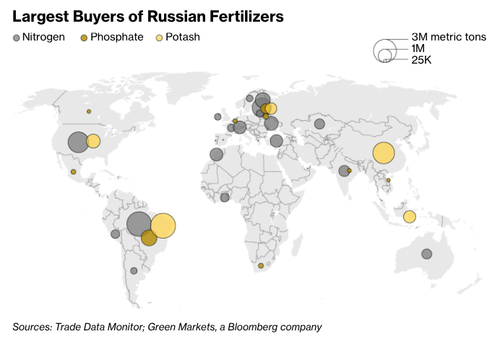“Mega Emergency” Unfolds For World’s Top Coffee Growers As Fertilizer Costs Spike
Coffee farmers worldwide are feeling the pressure of sanctions, as the Russian invasion of Ukraine sent fertilizer prices soaring, prompting concerns of declining harvests this year.
Bloomberg reports coffee farmers in Brazil, Nicaragua, Guatemala, and Costa Rica, some of the largest coffee-producing countries in the world, are having trouble affording high fertilizer costs. Some farmers are substituting organic waste as a low-cost solution to nitrogen, phosphorous, and potash fertilizers. The move, however, will result in significantly reduced harvests of the bean.
Readers may recall we published a chart pack over the weekend of how the Ukrainian conflict and resulting sanctions by western countries on Russia have choked the world of natural resources, sending prices of commodities higher as traders fear shortages.
One chart shows that Russian fertilizer exports end up in South America, a top coffee-producing region.
We noted in a separate piece that Brazil, the world’s top coffee producer, imports more than 85% of its fertilizer demand. Russia is its leading supplier, and Belarus provides 28% of the total. High prices for the nutrient and or even reduced shipments because of sanctions could jeopardize the world’s coffee harvest this year.
“The situation represents a mega emergency for our members,” said Fatima Ismael, general manager of the Nicaraguan coffee cooperative Soppexcca in Jinotega.
Prices for arabica in New York are flat on the year but could soon increase as fuel and fertilizer prices skyrocket. The Green Markets North American Fertilizer Index is up a little more than 30% this year, and crude oil is up 50%. Fertilizer and fuel are two major cost factors in cultivating coffee.
Xinia Chaves, executive director of the Costa Rican Coffee Institute, warns that insufficient fertilizer will reduce farmers’ yields this year.
Rodrigo Vargas, president of Doka Estate in Costa Rica, said his farm needs 1,400 tons of fertilizer to produce 40,000 bags of coffee each harvest. Due to soaring prices, he’ll be spreading less fertilizer on the soil and understands this will hurt yields.
Arabica coffee prices have risen 86% over the last two years due to adverse weather conditions affecting Brazilian harvests and snarled supply chains increasing freight costs.
For over a year, we’ve been pointing out how several factors would push the world into a coffee deficit.
“Nightmare” Of Factors Pushing World Into Coffee Deficit
“Prepare For The Worst” – Caribou Coffee Panic Hoards Arabica Beans Amid Global Deficit
Rabobank Warns Coffee Prices May’ Soar Out Of Control’ As Stockpiles Plunge
The latest data from the International Coffee Organization warns global coffee production will slip 2.1% to 167.2 million bags for this year, mainly due to a 7.1% decline in arabica beans. Cofee prices will continue to soar. The move-in overall food inflation isn’t over and will go higher.
Tyler Durden
Thu, 03/24/2022 – 05:45


Recent Comments